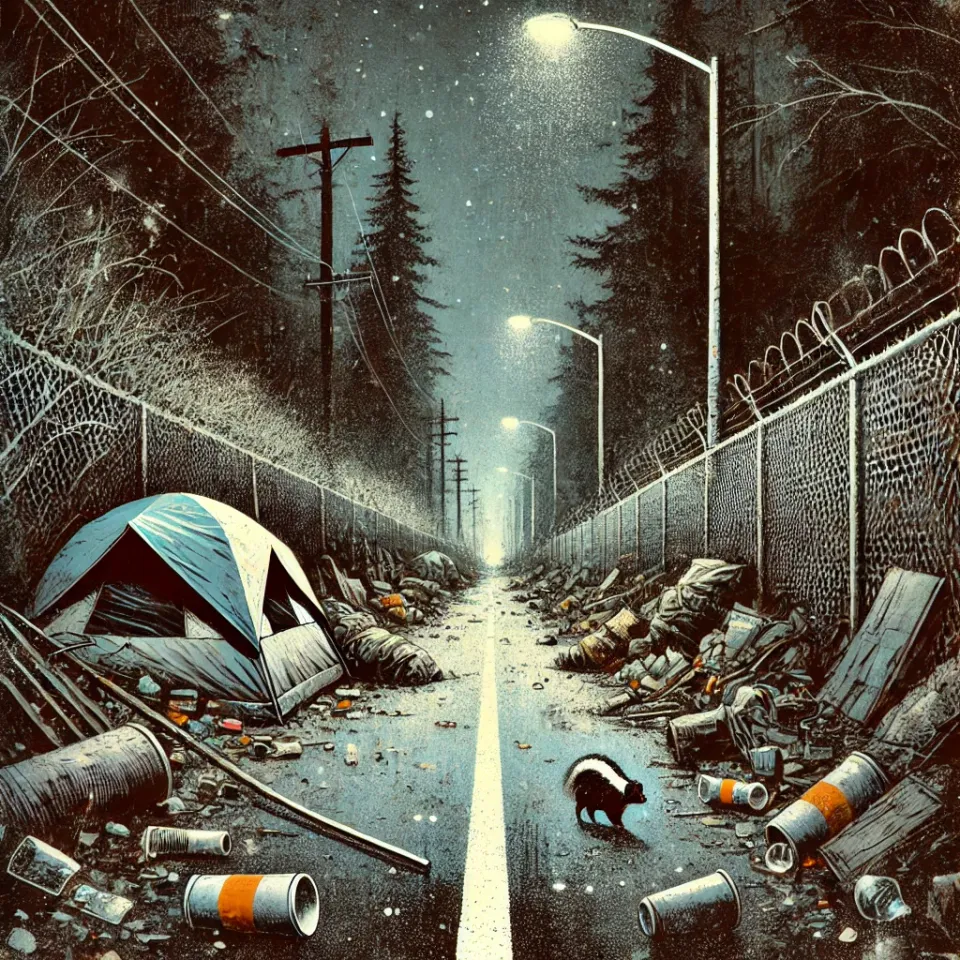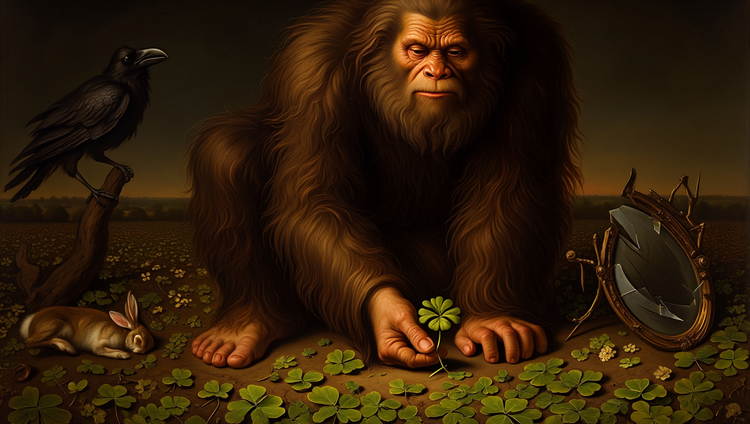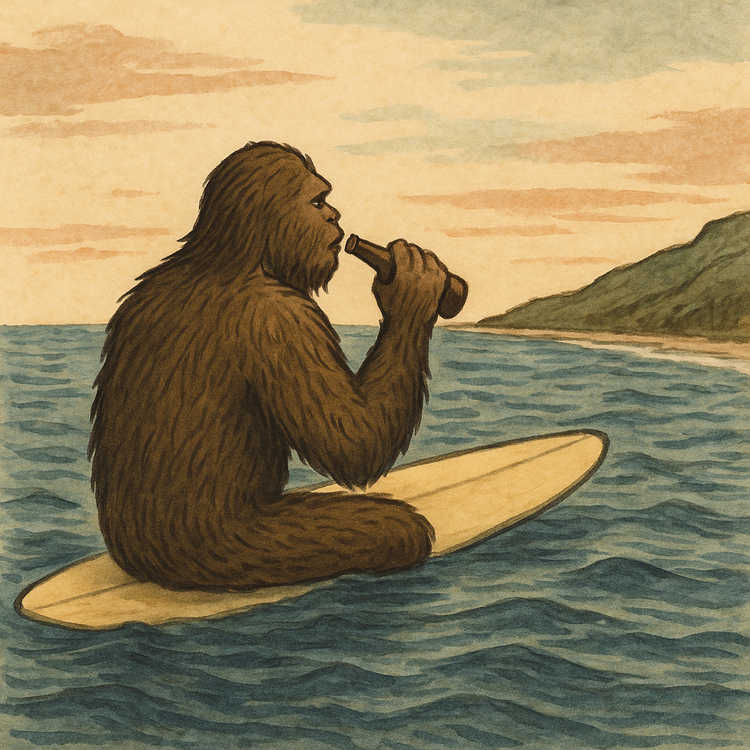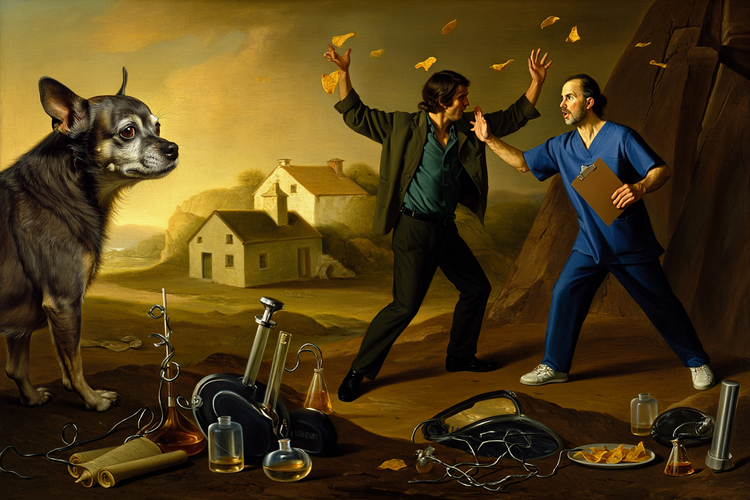Portland, OR

One thing I didn't know before I moved to Portland is how much fun it is to bike around a city at night. Truthfully, I used to be part of an immature gang called "Hobo Club". As misguided youths, we rode our bikes around a sleepy college town until very late, then slept outside using whatever loose materials (usually school newspapers) we could find. It was pretty fun, but nowadays, although I still bike around at night, I ride a much more sophisticated bicycle in a much larger and wilder place.
You can do this year round, thanks to the temperate (some would say "crummy") climate. And rechargeable bike lights mean anywhere within a 10-20 mile radius is pretty much fully accessible.
From my garage, that radius includes: the city center, industrial railways, a river confluence, old growth forest, and innumerable individuals with a wildly different point of view from myself.
A bike is a great way to run across them. Especially at night, when the–personal opinion–more interesting ones come out. Portland, for all its natural beauty, is notorious for its underbelly. Most people know about our imperfections. We're not exactly one giant tent fire (as many believe), but finding large "un-gridded" settlements is not hard.
Tarps, propane cans, hollowed-out trucks. "Stuff" just seems to seep out of the highway and into bike lanes, curbside planters, and edges of the forest brushing up against the city. The plants, if not beaten back, would slowly invade this concrete substrate and turn it into soil. Housing material accumulates organically in the absence of strict enforcement.
Thin, crisscrossing lanes of asphalt slice through all of these places: edging pristine forests and passing straight through hearts of urban decay. You can see it from a car, but you can smell it on a bike.

One of the most bizarre things about Portland is how close this state of humanity is to nature. Within the city limits, an eight mile stretch of forest harbors two-hundred-year old Douglas firs. Maybe it's not Yosemite, but there are plenty of wild things roaming inside. Raccoons, coyotes, and other mesopredators now dominate this habitat, unleashed by the eradication of bears and wolves from the area.
City and forest are arbitrary distinctions at the margins. For a coyote, prey that scampers between a sword fern (native) and a clump of lavender (invasive) is still perfectly fine to be eaten. They're not as gastronomically picky as your average Portlander.
From my bike's headlights, I've lit up the eyeshine of prowling coyotes in suburban front yards more than a few times. I've seen a pack of otters in a pond wedged between two industrial parks. On a regular basis, I stitch up dogs who have just found out that raccoons cannot be easily run off like some sissy labradoodle in the dog park. These dogs never knew what it's like to fight for your actual life.

Nutria, a sort of mini-beaver rat (also known as coypu) graze on foggy winter grass in roadside planters. They're also invasive, brought to this continent by industrial fur farmers, but now roam freely. You might see them in a strip mall parking lot.
They do cause some ecological damage, but they're also mostly restricted to strips of marshland and smaller rivers. As colonizers, they should be extremely unpopular in Portland, but on the other hand, we've got more Vegans than would fit in your average MLS stadium,¹ so nutria at the very least an uncomfortable species for us to live alongside.

I live in Portland, but I don't live in these places. They're off the grid but hidden within it. I only cycle through, watching and wondering how life is sustaining itself in these mosaic habitats between city and nature. Who's shooting tendrils into who?
I might bike home late at night, under a highway overpass, my headlight picking up the yellow green eyes of a passing skunk, or the reflective tags on a tent. As a veterinarian, there's a vague familiarity: I've treated wildlife and pets living on the streets. But I know I'm an alien here. These aren't my harsh conditions.
It's where I live, and what I see. I'm a citizen of this unique place, ordinarily so vocal about suffering. I'm a biological organism, networked into this complicated system. And this city lives and breathes because of its dependence on an extraordinarily powerful force called "humanity" with the ability to rip wealth out of raw materials.
I sympathize with the raccoons that mauled the corgi. Nobody offered to stitch them up. I thread my tires around the broken glass.
It's so confusing. The back and forth between earth and something else. This has never really happened before.
But then, I remember the city has a heart. And it's in the right place. Solutions to very complicated problems are hard. Maybe we're just in a phase. Geologically speaking, we're so fresh as a species that disruption, ecological or otherwise, might just be unavoidable.
Bizarrely, our ability to manipulate the environment into "products" empowers our greatest achievement: self-sacrifice. Because most of us aren't in this constant state of primal urgency, we can afford generosity. Materially, we live comfortably–if anxiously. The system gives us the freedom to give back. Portlanders spend (an above average) time volunteering. Altruism, a biologically perplexing phenomenon, is self-evident in this city.
And maybe this patient idea can be nurtured like a growing flower. Maybe it truly will sprout from cracks in the concrete to become something beautiful. We've interrupted nature, but we haven't done it perfectly. It seems she's trying to teach us something. In theory, it might eventually lead to a truly prosperous utopia. It's a lovely idea.
Maybe things will get better, for all of us.
- Given Portland's population of 652,000 and an estimated 5-8% of residents being vegan, the number of vegans ranges from 32,600 to 52,160. The average MLS stadium capacity is 20,000 to 25,000 seats. Since both estimates of vegans in Portland (32,600 to 52,160) exceed the average stadium capacity (20,000 to 25,000), there are enough vegans in Portland to overflow an MLS stadium. Check my math.





Comments ()